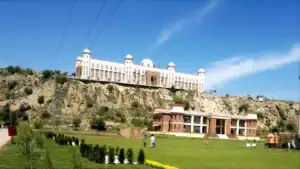Sindh Government’s SPHF Programs: A Transformative Initiative for Housing and Community Development One major step towards meeting the housing needs of populations devastated by floods has been taken by the Sindh government. With the goal of rebuilding lives and offering support to those affected by the severe flooding in the region, the Sindh People’s Housing for Flood Affectees Program was launched.
![]()
Background
Heavy monsoon rains and river overflow have caused frequent flooding in Sindh, a province in southeast Pakistan. Numerous families have been left homeless and are in critical need of aid as a result of the significant damage that these floods have done to houses, infrastructure, and agricultural land. Recognizing the gravity of the situation, the Sindh government created the Sindh People’s Housing for Flood Affectees Program in an effort to provide long-term assistance and relief.
![]()
Objectives of the Program
The primary objectives of the Sindh People’s Housing for Flood Affectees Program are:
- Rebuilding Homes: For people who lost their homes to flooding, the program seeks to build new residences. This involves offering sturdy, safe housing that is impervious to upcoming natural disasters.
- Restoring Livelihoods: The initiative helps flood victims restore their livelihoods and enhances their general quality of life by offering stable homes. One essential element in helping impacted people reconstruct their lives and resume normalcy is stable housing.
- Community Development: The project also prioritizes the development of the afflicted districts’ general infrastructure. This includes making improvements to sanitary facilities, roads, and the availability of basic services.
Key Features of the Program
The Sindh People’s Housing for Flood Affectees Program incorporates several key features:
1. Construction of Resilient Homes: The initiative places a strong emphasis on creating dwellings that are both practical and flood-resistant in the future. This calls for the use of strong building materials and methods that are resistant to adverse weather.
2. Financial Assistance: For those who are impacted, the government offers financial assistance to help them rebuild their homes. This support is intended to help with a variety of building and restoration-related expenses.
3. Community Involvement: The initiative promotes local communities’ participation in the reconstruction effort. This strategy guarantees that the solutions offered are customized to the unique requirements of the locals and encourages a feeling of empowerment and responsibility among the impacted groups.
4. Partnerships with NGOs and Private Sector: To increase the program’s efficacy, the Sindh Government works with partners in the private sector and non-governmental organizations (NGOs). These collaborations aid in the mobilization of extra resources, knowledge, and assistance.
Implementation and Progress
The most badly impacted areas have been the beginning point for the phased implementation of the Sindh People’s Housing for Flood impacted Areas Program. The first stage was evaluating the harm, determining who qualified for assistance, and starting the building of new residences.
Significant advancements have been made in a number of areas thus far. In addition to the several families who have already benefited from new homes, more are still being built. Additionally, the program has effectively upgraded the infrastructure in areas devastated by flooding, aiding in the communities’ overall recovery.
Challenges and Solutions
While the program has achieved notable successes, it has faced several challenges:
1. Resource Constraints: The program’s extensive demands have been difficult to meet due to a lack of material and financial resources. In order to solve this, the administration has looked for more funds from a number of sources, such as foreign donors and development partners.
2. Logistical Issues: Logistical problems have impacted the construction process, including challenges in getting materials to remote locations. In order to secure the timely delivery of resources, the government has collaborated with local authorities and logistical companies.
3. Community Coordination: It has not always been easy to ensure efficient coordination with local communities. To address this issue, the government has made an effort to enhance communication and include local leaders in decision-making procedures.
Impact on Affected Communities
The lives of those afflicted by flooding have been significantly impacted by the Sindh People’s Housing for Flood Affectees Program. Numerous families have been able to rebuild their lives with a sense of security and stability after being allowed to return to their homes. The program has also improved infrastructure and access to necessary services, aiding in the general development of flood-affected areas.
Particularly helpful has been the program’s emphasis on creating resilient housing and integrating local communities in the reconstruction process. It has not only brought about instant alleviation but also established the groundwork for long-term development and healing.
The Sindh Government intends to carry out and grow the Sindh People’s Housing for Flood Affected Residents Program in the future. Subsequent stages will center around finalizing the ongoing construction projects, attending to any outstanding requirements, and augmenting the program’s efficacy by means of feedback and insights gained.
In order to increase the resilience of communities affected by flooding, the government also plans to incorporate other measures, such as improved flood management systems and community-based disaster preparedness initiatives.
Conclusion
The Sindh Government has made a major effort to meet the housing requirements of communities impacted by flooding through the Sindh People’s Housing for Flood Affectees Program. The initiative has made significant strides toward aiding individuals and families in recovering from the catastrophic effects of flooding by emphasizing the construction of resilient dwellings, offering financial support, and collaborating with local communities.
The program’s achievements demonstrate the value of all-encompassing and cooperative methods to disaster recovery, even though there are still obstacles to overcome. The idea has potential for significantly enhancing the lives of flood victims and advancing Sindh’s general development as it develops.









